Arena – Winter 2023

|
In This Issue
|
|
Rita Schaad, NSW
 Over the past few decades, ANZURA has created a ‘well oiled’ routine, spread out over 12 months, following our statement of purpose in the Bylaws:
Over the past few decades, ANZURA has created a ‘well oiled’ routine, spread out over 12 months, following our statement of purpose in the Bylaws:
ANZURA is designed to encourage the study of The Urantia Book and to assist in the dissemination of its teachings by non-invasive, moderate, evolutionary growth.
This we aim at when encouraging and promoting regional Study Days, conferences, and the in-person and online weekly or monthly study groups. The Arena newsletter is both an information tool for these activities as well as an historical archive.
Other activities that Urantia Book readers in Australia and New Zealand can participate in are a wide range of choices offered from other constituent associations of Urantia Association International from all over the world. The internet is making it all possible.
I would like to announce the results of the election for ANZURA’s governing board that were held in the AGM at last year's conference. (We somehow missed this when reporting on the AGM in the last Arena.) The complete Board is now:
- President: Rita Schaad (newly elected)
- Vice President: Ian Campbell
- Secretary: Merindi Belarski (newly elected)
- New Zealand Representative: Marion Steward (newly elected)
I would like to congratulate and welcome the new board members and thank outgoing members, Susan Hemmingsen, Graeme Chapman and Phillip Marriott for giving of their time and good will over the past years to fill these positions.
The National Study Day in May saw a couple of groups come together. The ones who can manage to get to these regional day-gatherings always enjoy it tremendously. Both the social aspect of it and the immersion into a paper from the book together is so valuable.
Regina in Melbourne had four people at her home, and at Trevor and Kathleen Swadling’s home in Sydney nine people gathered to share a pot-luck lunch and studying Paper 192 – Appearances in Galilee. Our Friends in New Zealand were not able to join us in this event this year, having had such a difficult time with floods and storms impacting the normal running things. I remember feeling so helpless when looking at the radar images showing blue and dark-red weather systems over the Islands of New Zealand and fearing that people we know may be affected by it.
Paper 192 was chosen because of the detailed personal advice Jesus gave to his Apostles, after his resurrection, to prepare them for the rough times ahead when he would no longer be amongst them. As always, Jesus had wonderful insight into each of his friends’ peculiarities and characters and could address particular needs that they needed to be mindful of when dealing with others. When sharing what we learn from The Urantia Book, we need to know both ourselves and others and endeavour to balance our intense zeal to broadcast ‘important’ facts with the receptivity and desire to learn something new in others. This is something we will be focusing on at this year's conference in Sydney in August 25-28 at a lovely location in Pymble. A dedicated team is at work now to bring the theme alive for when we’re “Talking’ Bout a Revelation”. (See details in this Arena for more information and registration. We hope to meet you there.)
To whet your appetite for the kind of things that are in stall for participants on such conferences, we include in this Arena some other presentations given last year in Tasmania. You can find the entire conference archives and talks given for 2022 – and before – on our website at: https://anzura.urantia-association.org/tag/2022-conference-tasmania/
Another place to look up secondary works from our own ANZURA members and various other Urantia Book students in Australia and New Zealand is by clicking on https://anzura.urantia-association.org/topical-index-study-aids/
These articles come about through long and deep thinking over issues that are very close to the hearts of the writers – mostly our ANZURA siblings – and we would do well to at least have a look at them and perhaps comment and have dialogue with their authors by emailing anzura.urantia@gmail.com
The latest works uploaded to the site are from Neil Francey - On the Revelatory Status Past, Present and Future , which we introduce in this Arena. Another is from Julian McGarry; The Unfinished Business of the Fourth Epochal Revelation, https://anzura.urantia-association.org/2023/05/19/the-unfinished-business-of-the-fourth-epochal-revelation/ where Julian tackles the question that many readers ask themselves: Are we, as Urantia Book readers and organisations on the right track with what we are supposed to be doing while holding, or safe-keeping, such a treasured revelation in our hands? Some of us feel the need to become more active and engaged with such conundrums, while others choose to think and pray about what they can do in their personal lives ‘behind the scene’ as such. It’s a good topic that we can at least talk about together; to discuss and uplift one other.
At this year’s conference a detailed catalogue will be available of the secondary works we purchased last year. Some of these publications are artistically beautiful, while others are intellectually stimulating and spiritually uplifting, making some of the harder concepts in The Urantia Book a bit clearer in our minds. The latest book that is a good example of this is The God Experience written by Mark Bonair from Canada.
Also, a reminder that becoming a member of ANZURA is like saying – “I belong to this Urantia Book readers family in Australia and New Zealand.” We would warmly welcome you! ☺. (Contact us about how to become a member or go to the website at https://anzura.urantia-association.org/membership/.)
Regards and keep warm this winter
Rita
|
|
Conference Committee 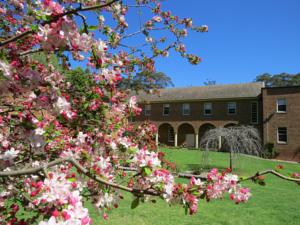 The time is drawing near for this year’s annual conference – 25 to 28 August at Peter Canisius House in Pymble, Sydney. (We’re slightly earlier this year due to date constraints for our usual time a little later in the year.)
The time is drawing near for this year’s annual conference – 25 to 28 August at Peter Canisius House in Pymble, Sydney. (We’re slightly earlier this year due to date constraints for our usual time a little later in the year.)
Registration:
If you’re planning on coming, please get your registrations in as soon as possible so we can start getting the final planning details arranged. To register, you may click on the link at the end of this message for the conference brochure and fill out the registration form (you’ll need to print it out and either post or email your form to us). Alternatively, you can send us an email with your details and payment method.
Theme: Talkin' Bout a Revelation
How are we talking about the concepts of The Urantia Book with non-readers and new readers? How can we discuss such universal truths that everyone needs to know without alienating them? How can we convince increasingly secular, sceptical and materially focused people that the spiritual world is just as real? How can we help to transform stagnant traditional religious practice into courageous living and dynamic spiritual growth?
We have in our hands an updated version of revelations presented to our ancestors that over time have become unclear and unappealing to many in our modern world. It is a very big book that requires years of invested time and effort for most of us to even glimpse an understanding. But when we do understand, we realise that we know what the world needs most to hear to help meet present day challenges and improve the lives of everyone on this planet. How can we, seasoned readers, best demonstrate and discuss what we have learned in ways that attract others to the book and its teachings, and that doesn’t do harm to our message? How can we better identify fertile ground: those who may be seeking and receptive to the seeds of truth we have to offer them? What might be their objections and criticisms and how should we best overcome them?
At this year’s ANZURA conference we hope to tap into and share that huge reservoir of knowledge, understanding and talent that exists within the readership community. Please join us as we workshop the core fundamentals of the books teachings and develop some practical tools and attractive ways of talking about this planet-saving revelation with the people we meet in our everyday lives.
“Freely have you received; therefore freely should you give of the truth of heaven, and in the giving will this truth multiply and show forth the increasing light of saving grace, even as you minister it.” (176:3.10, 1918.3)
The act is ours, the consequences God’s. (48:7.13, 556.13)
Cost:
Full Conference: $500 – includes 3 nights of twin-share accommodation and all meals from Friday dinner to Monday breakfast.
Daily Rate: $100 – includes lunch and dinner.
Daily Rate: $50 – includes lunch only.
For more detailed information click here
Registration
Click here for the registration brochure
Or click here to email us or give us a call on 0431 285 943.
|
|
Phillip Marriott, SA  (This was presented by Phillip at the 2022 Tasmanian conference)
(This was presented by Phillip at the 2022 Tasmanian conference)
What is “Spirit Unity” and where does it exist?
It’s very easy to have diversity, difference of opinion and divergent viewpoints, because we are human; our personalities are unique and my experience is personal. I may go through a shared event or tribulation, but my experience is mine and mine alone.
Jesus discussed this in Paper 141, section 5.1-4:
Spiritual Unity
One of the most eventful of all the evening conferences at Amathus was the session having to do with the discussion of spiritual unity. James Zebedee had asked, “Master, how shall we learn to see alike and thereby enjoy more harmony among ourselves?”
“…What I require of you, my apostles, is spirit unity — and that you can experience in the joy of your united dedication to the wholehearted doing of the will of my Father in heaven.
“You do not have to see alike or feel alike or even think alike in order spiritually to be alike. “ (141:5.1-4, 1591.6)
Spirit Unity is something which must be strived for and worked at; it will not come automatically. It must be consciously thought out and sorted.
I recently had an encounter at a book promotion that I do on a regular basis. I had set up The Urantia Book stall and next door to me was another religious group offering prayer sessions, blessings, sunscreen, bottled-water and colouring-in pictures for the children. I think their curiosity was pricked when they realised that I was also talking about Jesus, God, and things spiritual. I was approached by a young man and invited to engage in conversation; he asked about the book and what it was all about, so I gave my usual spiel.
I could see his eyes getting wider as his excitement built, then he could no longer contain himself. He cut into my talk and then proceeded to tell me about his church, his beliefs and where I was wrong and how we differed. He asked some rather poignant questions and proceeded to answer them before I even had a chance to reply. Because I was considering this topic of Spirit Unity, I tried to point out our common ground, to which he politely nodded. Love for God, and Jesus, that we are all brothers and sisters, etc. But it was to no avail, I was to be set right. I had to accept that Jesus died on the cross for our sins and unless I did that, I could not have salvation and could not enter the kingdom of heaven.
I tried to point out that unless we could come to some sort of an agreement then we could not have fellowship, and with this type of divergent opinion amongst ourselves and other people, then we could never have peace and harmony. To which he politely nodded, then continued with his tirade. Fortunately, he was polite enough to allow me to engage with visitors to my stall. We agreed to exchange contact details so we could continue the conversation.
So, this got me thinking on my way home after the fair – how to have spirit unity. I needed to seek out what is common between us. Jesus did this very well, particularly during his journeys through the Mediterranean.
He selected five of the leading Stoics, eleven of the Cynics, and sixteen of the mystery-cult leaders and spent much of his spare time for almost six months in intimate association with these religious teachers.
And this was his method of instruction: Never once did he attack their errors or even mention the flaws in their teachings. In each case he would select the truth in what they taught and then proceed so to embellish and illuminate this truth in their minds that in a very short time this enhancement of the truth effectively crowded out the associated error. (132:0.4, 1455.4) emphasis mine
But of course, I could never hope to be as clever or sagacious as Jesus, and if there is no desire for unity then it will always be a one-way affair. So that was my point, if we could have both agreed to have fellowship – to be of friendly relations and that any differing opinions or thoughts be put aside and allow the common idea to come to the forefront – that this could be a foundation to then build upon. But it’s only going to work in an environment of co-operation and with a willingness to have peace and harmony.
Paper 103 explains:
The unity of religious experience among a social or racial group derives from the identical nature of the God fragment indwelling the individual.
…A group of mortals can experience spiritual unity, but they can never attain philosophic uniformity. (103:1.1, 1129.1)
There is great hope for any church that worships the living God, validates the brotherhood of man, and dares to remove all creedal pressure from its members. (103:5.12, 1135.2)
I often say that there are as many religions as there are people on the face of the earth.
Some common ground
- We both desire to know God, the father or even Jesus.
- We stumbled when I tried to explain things such as where God is etc.
- I want life after death, salvation.
- We faltered when I tried to explain what that life was going to be like. The method used to have life after death can be a stumbling block. So here we will have to agree to differ.
We will each have to do what we each think is right to have life after death, but we both desired it.
I say that I will try to be good, not commit sin, and be a moral person but this may not be enough in his eyes. But he must surely accept that it is better than the alternative.
Paper 131, The World’s Religions presents highlights from the main religions of Judaism, Buddhism, Hinduism, Zoroastrianism, Suduanism (Jainism), Shinto, and Taoism.
What is Spirit or spiritual unity?
I believe it is the desire to find spiritual common ground, belief.
Where does it exist?
I believe if it is to exist it first has to exist within – within the desire and then it can exist within our relationships.
Then we can allow the differing opinions and beliefs to exist, within an atmosphere of co-operation, love, and harmony. We can applaud the diversity and enjoy it, but it takes effort and work. We must be the change that we want to see in the world.
The book best sums it up with these final papers:
Pentecost was the call to spiritual unity among gospel believers. When the spirit descended on the disciples at Jerusalem, the same thing happened in Philadelphia, Alexandria, and at all other places where true believers dwelt. It was literally true that "there was but one heart and soul among the multitude of the believers." The religion of Jesus is the most powerful unifying influence the world has ever known. (194:3.17, 2064.3)
Christianity is seriously confronted with the doom embodied in one of its own slogans: "A house divided against itself cannot stand." The non-Christian world will hardly capitulate to a sect-divided Christendom. The living Jesus is the only hope of a possible unification of Christianity. .. . (195:10, 2084.1)
|
|
Rita Schaad, NSW  (This is a presentation given by Rita at the 2022 Tasmanian conference)
(This is a presentation given by Rita at the 2022 Tasmanian conference)
While preparing for this, I first and foremost really needed to look at the world today and its inhabitants and found myself observing and reflecting, changing ideas constantly. What were those most important points to share today – but in the end one makes a lot of compromises…
As far as the sad state of world affairs is concerned, nothing much relating to us humans have really changed. Things should actually be much more improved considering the Divine Adjusters have been able to flock to this sphere on account of the Spirit of Truth ‘being poured out upon all flesh’ and residing within all mortal minds for 2000 years.
The question I asked myself over and over again is how do people – how do we – get to that point where we receive a divine invasion resulting in an experience ‘so sublime’ that it is too deep for words?
click here for PDF
|
|
Jeff and Mahtab, USA  (This is a dialogue between Jeff and Mathab that was presented via Zoom at the 2022 ANZURA Conference in Tasmania.)
(This is a dialogue between Jeff and Mathab that was presented via Zoom at the 2022 ANZURA Conference in Tasmania.)
Jeff: Hi, Mahtab, good to see you. What have you been up to lately?
Mahtab: Oh, the religion of personal experience.
Jeff: Cool! Could you tell me about it a little?
Mahtab: Sure—after you answer the same question. What have you been doing?
Jeff: Same thing, what do you know! The religion of personal experience. I like the conference title and the phrase, “intimacy with God.” For me, the religion of personal experience involves times when I’m wrestling with the intimate details of my personal growth struggles. But I’m also writing about this religion of the spirit as we find it in Jesus and his gospel.
Mahtab: Tell me more.
Jeff: Sure—but—would you be willing to start?
Mathab’s discourse:
“In its true essence, religion is a faith-trust in the goodness of God”. (2.6.1) A recent health challenge made me wonder how true this statement is in my own personal experience.
One morning I woke up with my throat swollen up, and hardly able to swallow even my saliva. For the next few days, I tried to taking tiny bites of food, hoping that whatever it was would pass in a day or two. It didn’t, and in fact things took a turn for the worse. Gradually, speaking became uncomfortable and I started to lose my voice, followed by significant weight loss. After visiting with a few specialists, I received a diagnosis of laryngopharyngeal reflux disease or LPR. It took me some time to realize that this might become a chronic condition. I was scared, as nothing seemed to help, and I was desperately looking for an explanation for what had given rise to my symptoms in the first place.
This ordeal also made me aware of how much I had lacked in living faith. These had been difficult and uncomfortable times, and I found myself spiraling down the path of fear and anxiety. The Urantia Book tells us that “Faith is a living attribute of genuine personal religious experience.” (101.8.1) And it says that “a state of mind attains to faith levels only when it actually dominates the mode of living”. (101.8.1) In the earliest stages of my sickness, I felt entirely dominated, not by faith-trust in God, but by fear and uncertainty. In the thick of the moment, I had lacked that “living”, “expanding”, “releasing” and “liberating” faith and sublime trust in God’s over-care that would have opened me up to the guidance of his indwelling spirit. I easily lost sight of the truth that no matter what I was going through, God was still present. That the spirit of the loving Father of a universe who knows all still indwelled my mind, and that he was likely working tirelessly to teach me something amid this turbulent experience.
It’s been almost two years since that morning, and looking back, I have learned much about my condition and how to manage it. For instance, I have learned about dietary and lifestyle choices that likely gave rise to my ailment. And most importantly, the insight that when it comes to making decisions about diet and lifestyle, there is no “one-size-fits-all”. I will do well to tune in to my own body, rather than follow a popular trend. Mentally, I have become more patient and resilient, knowing that though my symptoms can be particularly bad on a given day, they are almost always better on the next. And that the body has a wonderful ability to heal, given time and the right treatment. As of today, I continue to learn about my condition and adapt accordingly.
More recently, as the dust settled and I began to gather myself and think more clearly, I realized the spiritual dimension of the problem more fully and was able to make some progress. I have been using a technique to help nurture a living faith-trust in my relationship with God. When clouds of uncertainty and feelings of fear start to gather in my mind, I have been pausing to first recognize them, then actively change my state of mind to a trusting mode: that assurance that all things work together for good, because God is good. I don’t always succeed in diverting my thoughts in this way, but I know that with practice, this can turn into a habit. I am grateful for every step of spiritual progress. Because of this trusting attitude, I am already noticing that my mind has become more active in spiritual domains. This faith-trust has moved me to make and execute decisions that will further allow the spirit of God to work in and through me. For instance, when I feel overwhelmed by the daily tasks ahead, rather than feeling paralyzed, I focus on a trusting attitude and take on one task at a time.
This experience has been of great value for me personally—in large measure because I have drawn on the universal value of Jesus’ personal experience. His life best demonstrates the concept of living faith. His personal religious experience forms the basis of the Gospel. We are told that his living faith “wholly dominated his thinking and feeling, his believing and praying, his teaching and preaching. This personal faith of a son in the certainty and security of the guidance and protection of the heavenly Father imparted to his unique life a profound endowment of spiritual reality.” (196.0.9) Jesus’ gospel was the good news of the Fatherhood of God and the brotherhood of man. Just as a child readily trusts his earthly father, we can trust our heavenly Father to watch over us and guide us in all circumstances of daily living. The Fatherhood (or parenthood) of God encompasses so much, above all a matchless love for his children. A loving Father desires his children to love him in return, but also to trust him with a whole heart. Indeed, we are told that “the goodness of God is found only in the spiritual world of personal religious experience.” (2.6.1)
Jeff’s discourse:
Mahtab, thank you for your open, courageous, and helpful sharing. And also, for that beautiful and insightful concluding reflection on Jesus’ personal religious experience as the basis of his gospel.
Two months ago, when Mahtab sent me the first draft of her presentation, I was struck by what she emphasized: faith-trust in the goodness of God. I immediately sensed that this was important for me. I had never worked with this teaching. And I recognized that I had some deficiency in this area, so it was the perfect topic for me, too.
For the next two days, I struggled to comprehend faith-trust in the goodness of God—and got nowhere. Then I realized that I needed to exit my mind and get recentered in my soul. After all, it is the soul that discerns the goodness of God. Moreover, the soul is the spirit-perceiving part of us.
As I surged into my true self, I had the most flowing, beautiful, powerful, fulfilling realization of divine goodness that I have ever experienced. At the same time, recognizing the personality of God triggered worship.
But it’s one thing to have the gift of a glorious spiritual experience. It’s another thing to sustain faith-trust in divine goodness when we are struggling.
Jesus: asleep in the boat in the storm, awakened by terrified apostles—whom he rebukes: “Where is your faith?” They should have known that, as his closest associates, they would not perish in the storm. Does not the loving Master expect faith-trust in the goodness of God from all who would be great in the kingdom?
Living faith is both receptive and active. It is receptive, for example, to how God answers prayer. He gave Mahtab an expanded revelation of truth, an enhanced appreciation of beauty, and an augmented concept of goodness.
Living faith is also active. Faith, given by God, comes with unsuspected power. If we mobilize that power, active faith allows divine spirit to do good for us, with us, and through us.
Here's one of the coolest things that faith can do. I quote:
The cry of the righteous is the faith act of the child of God which opens the door of the Father’s storehouse of goodness, truth, and mercy, and these good gifts have long been in waiting for the son’s approach and personal appropriation. (Paper 146:2.8, 1639.3)
The Father’s storehouse of goodness is within you. It’s like the cook who has prepared the meal for the guests and calls out, “Come and get it.” Appropriation means making the gift truly your own.
When your faith goes into action and you trust in the goodness of God, you expect good things to happen. Expectancy makes a big difference. Recall the Bethsaida hospital, where Jesus visited those who were sick. It was noted that:
Transformations of mind and spirit may occur in the experience of expectant and faith-dominated persons who are under the immediate and inspirational influence of a strong, positive, and beneficent personality whose ministry banishes fear and destroys anxiety. (148:2.2, 1658.5)
Next, let’s invite God to augment our concept of his goodness.
“The goodness of God rests at the bottom of the divine free-willness—the universal tendency to love, show mercy, manifest patience, and minister forgiveness.” (2:6.9, 42.1)
Stop and Ponder:
The goodness of God rests at the bottom of God’s free-willness.
God’s free-willness is the Father’s tendency to love, show mercy, manifest patience, and minister forgiveness.
And it’s not only God’s tendency. It’s the universal tendency. This means that God’s goodness is at the bottom of the same tendency in you.
So as you love, show mercy, manifest patience, and minister forgiveness—you can know that at the bottom of it rests the goodness of God.
Next, here are some tips about how to enhance your experience of faith-trust in the goodness of God. After this discourse, we’re going to take five minutes to try it out.
In my opinion, a major key to enhancing our spiritual experience has been discovered by research in the field of positive psychology. In her book, Positivity, Barbara Fredrickson describes a natural tendency for positive emotions to blossom and fill us, if we help this to happen, and allow it to occur. The ten most common positive emotions are also the ones which affect our daily lives the most: [expressively] gratitude, joy, awe, inspiration, serenity, interest, amusement [laugh], feeling good about oneself [dancing a bit]—and the last one, encompassing all the others, is love. Tip: Fredrickson says that for these words, these labels, to become truly meaningful to us, we must connect them with our own experiences.
Fredrickson finds that most of the time, we do not allow positive emotions to blossom and fill us. We have a positive feeling at a modest level—and we assume that’s it. So we don’t open ourselves for anything else. Instead, we get distracted and move on to something else.
But we can nurture this blossoming. Tip: Interpret things and ideas as they unfold—in ways that generate positive emotions. She writes, “You allow yourself to take a moment to find the good, and when you do find it, you support it and let it grow.” The Urantia Book says practically the same thing referring to the indwelling spirit of God: “Why do you not encourage the heavenly helper to cheer you with the clear vision of the eternal outlook of universal life as you gaze in perplexity at the problems of the passing hour.” (111.73)
So in response to our recognition of God’s goodness, what may begin as a warm feeling in the heart can rise all the way to loving worship.
One more Fredrickson finding: When our ratio of positivity over negativity improves to the point where the positivity is three times as much as the negativity, then our whole life shifts into a higher gear.
OK. That’s it. Next, we have a five-minute period of silence for you to allow and encourage the blossoming of your faith-trust in the goodness of Go
|
|
Robert Coenraads, NSW
An Experiential Exploration of Relaxation, Meditation, Prayer and Worship and its Benefits to Soul, Heart, Mind and Body
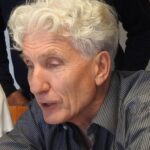 (This is a presentation given by Robert at the 2022 Tasmanian Conference)
(This is a presentation given by Robert at the 2022 Tasmanian Conference)
Introduction
All formal religions and individual spiritual pilgrims have, at their heart, a basic desire to connect or become one with a greater good. It lies somewhere at the core of their belief system, perhaps smothered by a greater or lesser amount of superficial ritualistic practices.
Western religions appeal to the intellect and promote desirable moral practices through examples given in the scriptures. Outsiders, and members of the church, often complain that, try as they may, it really doesn’t seem if there is anyone listening ‘up there’ as the realities and stresses of day-to-day living become increasingly complex and difficult to manage.
Eastern traditions take their adherents by the hand, sit them down and teach practical techniques for clearing the mind, being present and aware, and simply ‘listening’. These highly effective techniques have made their way to the West and developed into various forms meditation that have continued to evolve into practices to meet specific needs, and they have been scientifically demonstrated to achieve results1.
Philosophy speaks of everybody being an individual ‘Self’ making up a part of a greater whole. It is a concept much akin to the Holy Spirit of the Bible or that of the evolving Supreme Being of the Urantia Book. Philosophy calls the Self ‘Atman’ and the Supreme Self ‘Param Atman’ of which every individual is a part.
Supreme or Universal is a good name to use, particularly as such a term does not align itself, or show preference for, one religion’s terminology over another, yet embodies the concept that each religion’s preferred name for its own deity also implies universality and supremacy. The fundamental premise that we are all part of the Supreme and that the Supreme resides within us, and that we all seek permanent and infinite union with this Supreme.
Tools to Enjoy a Religion of Personal Experience
Most religions have volumes of scriptures, and secondary writings by their most respected masters, adherents or disciples, but, at the very heart of their core teachings, it is about cultivating a relationship of love, respect, or worship for a Universal Supreme who resides within, or permeates and binds, all of humanity, the entire world, as one. However, adherents of particular traditional religions are usually required to believe in their specific scriptures, often to the exclusion of others, and to faithfully follow their creed usually requires a belief in the unseen or the unprovable. Most intelligent individual spiritual seekers find this off-putting, and really desire nothing more than to discover and participate in a religion of personal experience.
Blind faith can be hard for some, for example scientists who prefer factual observations and concrete theories, however a religion based on personal experience goes far beyond that. It is something that is actually felt or experienced within the self. It is based on actual feelings of happiness, joy or love that are personally experienced when one acts or thinks in a particular way, or interacts with others in a particular way, or, perhaps, interacts the Universal Supreme in a particular way. It is a relationship in which you don’t have to believe, you simply have to feel and experience it personally. The Universal Supreme is known by many different names, depending on the religion that is followed, be it Allah, Yahweh, Almighty, God or simply Father, but any thoughtful person knows them to be one and the same, and a religion of personal experience allows direct access to the vast storehouse of love emanating from that Source who, in fact, resides within each of us, waiting to be discovered, tapped and shared.
Communication with the Universal Supreme is not experienced in the mind, which is the usual space in which we operate on a day-to-day basis, but instead it must be personally felt within the heart and soul. That is why the technique is not so easy to capture at first. It requires a little practice and patience to attain focus; a sense of stillness and equanimity within. The mind must first become stilled and calm; it must be present in your body, it must be there in the room or place where you are, attentive to your needs, and not wandering about aimlessly in the past or the future—not thinking about where you were and what you did yesterday, neither in the future plotting and planning for things to come, nor worrying about the trials and tribulations of life. Once the mind is calm and still, the heart and soul are free to communicate directly with the Universal Supreme that is found within and all around. Communication is not done via words or thoughts, but by feelings and emotions which, unlike a specific language, are universal and common to everyone. Feelings of joy and bliss and thankfulness can then emanate from the inner self shooting into the heavens like searchlight beams. Once the feelings and emotions are completely expended, freely given up to the Supreme, there comes a profound and deep silence within. This silence may last for a shorter or longer time, or perhaps only for a brief moment, but it is a moment of communion, complete oneness of the individual Self with the Supreme Self.
Appreciating these ideas is one thing, but putting them into practice requires some discipline and practice each day, morning and evening. Familiar religious practices or social rituals in the company of like-mined souls can help, like comfortable, well-known acquaintances; be it slipping the shiny well-worn beads of the Rosary between your fingers to the melodic chant of the Hail Mary, or perhaps the familiar calls to prayer in the coolness of the pre-dawn in eager anticipation of the coming day, or perhaps the rhythmic rocking of the body to the Torahic verses, or the congregational singing of full-voiced hymns of adoration and praise.
A Religion of Personal Experience, as the name suggests, is an even more intimate experiential relationship and there are a set of established spiritual tools or practices, tried and tested over the millennia of human existence on this planet, on which countless books have been written, and which I have distilled here for your immediate practical use. From here onwards you are asked not to believe what you are reading here, but to try for yourself, and feel through experience if such an approach has merit. If you do experience hints of calmness, oneness with all, joy, happiness, or the slightest glimpse of universal understanding, you are invited to continue to practice these techniques on a daily basis. Like exercising your physical body for good health, you must continue to hone and develop your heart and soul’s ability to express themselves—to give and receive freely.
What are the Spiritual Practices in The Urantia Book
The Urantia Book3 describes traditional religion, with its ritual, sacrifice and outward displays of piety as hollow and empty compared to the religion of personal experience. Spiritual practices in the Urantia Book place high importance on practices described as relaxation, meditation, prayer, or worship.
Although these terms all fall within today’s sphere of meditation with their objectives being similar,
the Urantia Book specifically defines these terms and places them in in a hierarchy from ‘relaxation’, ‘meditation’, ‘prayer’, and reaching a crescendo in ‘worship’.
The following quotes from The Urantia Book shed light on the meaning of these terms:
Prayer and its associated worship is a technique of detachment from the daily routine of life, from the monotonous grind of material existence (144.4.5, 1621.4)
The contact of the mortal mind with its indwelling Adjuster, while often favoured by devoted meditation, is more frequently facilitated by wholehearted and loving service in unselfish ministry to one’s fellow creatures. (91.7.1, 1000.2)
Paragraphs 91:7:2 and 125:4.4 show us that meditation is considered distinctly from prayer:
Jesus often took his apostles away by themselves for short periods to engage in meditation and prayer, but for the most part he kept them in service-contact with the multitudes. (91.7.2, 1000.3)
When this, his second day in the temple, was finished, again he went to Bethany for the night. And again he went out in the garden to meditate and pray. It was apparent that his mind was concerned with the contemplation of weighty problems. (125.4.4, 1382.2)
The word, ‘pray’ or ‘prayer’ is used more frequently in The Urantia Book, appearing 107 times. It is used in the sense of asking for something, and it is used distinctly from the word ‘worship’
When man learned that prayer could not coerce the gods, then it became more of a petition, favor seeking. But the truest prayer is in reality a communion between man and his Maker (91.2.3, 996.1)
When the prayer seeks nothing for the one who prays nor anything for his fellows, then such attitudes of the soul tend to the levels of true worship. 91:4.3, 998.1)
...prayer is designed to make man less thinking but more realizing; it is not designed to increase knowledge but rather to expand insight. (143:7.4, (1616.6)
Worship on the other hand is used 419 times in The Urantia Book. Worship is the highest note in the escalating musical scale of devotional activities beneficial to all individuals—beginning with rest and relaxation, then through reflection and meditation, then prayer, and finally worship, with worship being the ultimate act of devotion to the Father and the ‘ideal soul rest’.
At all times and during all ages the true worship of any human being—as concerns individual spiritual progress—is recognized by the indwelling spirit as homage rendered to the Father in heaven. (142:3.8, 1598.9)
The distinction between prayer and worship is emphasised on numerous occasions.
...prayer is spiritually sustaining, but worship is divinely creative. (143:7.5, 1616.7)
Prayer is self-reminding—sublime thinking; worship is self-forgetting—superthinking. Worship is effortless attention, true and ideal soul rest, a form of restful spiritual exertion. 143:7.7, 1616.9)
As prayer may be likened to recharging the spiritual batteries of the soul, so worship may be compared to the act of tuning in the soul to catch the universe broadcasts of the infinite spirit of the Universal Father. (144:4.8, 1621.7)
And consider the extraordinary reach of worship over that of simple prayer in the following paragraph in Paper 5 - God's Relation to the Individual
Prayers, all formal communications, everything except adoration and worship of the Universal Father, are matters that concern a local universe; they do not ordinarily proceed out of the realm of the jurisdiction of a Creator Son. But worship is undoubtedly encircuited and dispatched to the person of the Creator by the function of the Father’s personality circuit. (5:3.2, 65.4)
In the Bible meditation is also describes as a focus for keeping one whole steady and centred. It is referred to some 23 times, for example:
Isaiah 26:3 Thou wilt keep him in perfect peace, whose mind is stayed on thee: because he trusteth in thee.
Matthew 6:6 But when you pray, go into your room, close the door and pray to your Father, who is unseen. Then your Father, who sees what is done in secret, will reward you.
Worship is mentioned over 180 times in the Bible and also considered the highest form of devotion, that is the giving of one’s entire self, thoughts and emotions for God's use:
Romans 12:1 I urge you, brothers, in view of God's mercy, to offer your bodies as living sacrifices, holy and pleasing to God — this is your spiritual act of worship.
Meditation as a Spiritual Tool for Walking the ‘ROPE’
Popular types of meditation practices today are used to build stability of mind over time and the different approaches can be blended naturally until the perfect combination is found that suits your individual needs.
Below I order the modern meditation techniques into a progressive series of exercises according to the practices of rest, relaxation, meditation, prayer and worship.
- Mindfulness meditation
- Focused meditation
- Mantra meditation
- Progressive relaxation meditation
- Transcendental meditation
- Spiritual meditation
- Loving-kindness meditation
- Pure worship
For further information on the Practical Applications of meditation click here to view the entire PDF document. Here you will find a very helpful set of instructions on a variety of mediation techniques.
|
|
Phillip Marriott, SA  Being a student of The Urantia Book has inspired me to think of ways I can be of service to the revelation. I have found a few things that suit my skill levels, so I’d like to share with you some of my Urantia related activities in this neck of the woods namely, regular book promotions, weekly online Study Group, and my responsibilities and duties in Urantia Association International.
Being a student of The Urantia Book has inspired me to think of ways I can be of service to the revelation. I have found a few things that suit my skill levels, so I’d like to share with you some of my Urantia related activities in this neck of the woods namely, regular book promotions, weekly online Study Group, and my responsibilities and duties in Urantia Association International.
1. Regular Book Promotion
I organise a regular Urantia Book promotion booth at markets; the one I usually attend is The Queen of Wands Psychic Fair.
This fair is held once a month and moves to a different location each time, so there is always a variety of people who come to visit. I particularly like these types of events because people are a little more open to discussing things of an esoteric nature. They don’t run away like scared rabbits if I mention the word God, Angels, Spirits or Universal, etc.
In the past I used to do these promotions produce markets. Most of the time I met with a poor response and hardly ever sold any books. Interest was very limited, and I often wondered whether it was my approach. Finally, however, I concluded that I was fishing in the wrong barrel.
So now at The Queen of Wands Psychic Fairs, I sell at least one book each time, hand out brochures, and people will usually take a ‘spiritual vitamin’ which I promote as a “Thought of the Day”. (They are little pieces of rolled up paper with a quote from the book written inside.) Plus, I field the usual questions about The Urantia Book. Occasionally someone will come to me to say that they have or have had the book. I like to think that my stall may act as a prompt for them to re-read the book.
These fairs have been held at several locations here in South Australia: Robe, Burra, McLaren Vale, Moana, Blackwood, and Klemzig. Some are in the country, but most are in the suburbs. They are held regardless of the weather.
So, I will continue to do these as they are easily done with one person. Two would make it easier, but alas, there are no volunteers to help.
2. Weekly Online Study Group
Every week on a Wednesday night I host a Study Group via Zoom. On average we have five attendees from all over Australia: Newcastle and Batemans Bay in NSW, Canberra, Victoria, Queensland, and me here in Mount Barker, South Australia. I have just been contacted by someone who bought the book at the Burra fair; he is interested in joining the Study Group.
We have set a goal to read the book sequentially as some people have not yet done this. However, if the mood takes us, we may break off to do a topical study, but then we will resume where we left off.
The Study Group has been going for at least 3 years now.
3. Urantia Association International Responsibilities and Duties
I have several responsibilities and participate on some special projects for Urantia Association.
i) I am a member of the International Service Board (ISB) and serve as the Study Group Committee Chair. This committee meets twice a month, with currently four regular attendees. We have several projects on hand; shortly you should see a Study Group Survey request and a revised Study Group Guide. A current project is a Study Aide for Study Groups, and future projects will include a Study Group Symposiumand any thing else that comes our way.
ii) I am also serving on an ad hoc committee for the development of a Long-Range Plan for the Association. This is coming along nicely, and we should shortly have a resolution to put before the International Representative Council (IRC) and ISB.
iii) Recently I was working with Urantia Association’s Bylaws Revision committee. This revision has now been completed and have been submitted to the IRC and ISB for their approval and ratification.
So other than my own personal studies, I continue to run my business and socialise with friends and family up here in the bracing Adelaide Hills.
|
|
Neil Francey, QLD
Past, Present and Future
 This essay presents information about the origin of The Urantia Book in an endeavor to substantiate the claim that it is indeed a revelation to the people of this world. It is generally a record of events surrounding the book.
This essay presents information about the origin of The Urantia Book in an endeavor to substantiate the claim that it is indeed a revelation to the people of this world. It is generally a record of events surrounding the book.
Past revelations are considered for insight into their content, purpose, and contribution. Reasons for the partial acceptance of their message are also recorded. Could the fifth revelation also be only partially successful? Using the historical accounts of four revelations, it is possible to see what steps could be taken to contribute to the effectiveness of The Urantia Book.
These past circumstances and the current challenges are then projected into a future that can be achieved by using the Urantia revelation for direction.
View the entire Pdf
|
|
Marion Steward, NZ  Winter is well and truly here in our part of the world, and we have been enjoying both sunny days and quite cold nights over the past few weeks. In Auckland, especially, the sunny days have been a welcome change from the seemingly endless round of heavy rain, and storms that have afflicted us since the end of January. There hasn’t been enough time between these weather events to clean up after the flooding and repair roads and so on, and it is very tough for lots of people in different parts of the North Island right now.
Winter is well and truly here in our part of the world, and we have been enjoying both sunny days and quite cold nights over the past few weeks. In Auckland, especially, the sunny days have been a welcome change from the seemingly endless round of heavy rain, and storms that have afflicted us since the end of January. There hasn’t been enough time between these weather events to clean up after the flooding and repair roads and so on, and it is very tough for lots of people in different parts of the North Island right now.
I have been reflecting on the Urantia Book’s encouragement to ‘feast upon uncertainty’!
…long before reaching Havona, these ascendant children of time have learned to feast upon uncertainty, to fatten upon disappointment, to enthuse over apparent defeat, to invigorate in the presence of difficulties, to exhibit indomitable courage in the face of immensity, and to exercise unconquerable faith when confronted with the challenge of the inexplicable. (26:5.3, 291.3).
We are certainly being given many opportunities to put this into practice – the weather is so uncertain, Covid hasn’t gone anywhere, and we are now starting to experience the early phases of our national elections, where the outcome is also quite uncertain, but could bring in a lot of changes.
The teachings from The Urantia Book can certainly help to keep all of this in a universal eternal perspective.
Our online study groups have been continuing every fortnight, which keeps us in touch with each other, and provides a welcome distraction from the pressures of every day life. We did not manage to have a Study Day this year, for possibly the first time – everyone’s daily life just did not allow for us to come together. Hopefully it will be a bit more settled next year.
From Neville Twist, Auckland, New Zealand
 You must think that we kiwis are a hopeless lot, but not much has happened here for a while now – except rain, rain, rain! We still meet online (usually) every second week for our study group meeting. If all are in attendance, we number six. It is good to meet up and we enjoy each other’s company and contributions. If Trish and I are in Auckland, we try to hook up with Ian and Marion for a face-to-face meeting, which is always wonderful. Trish and I spent seven weeks in the lower North Island and the South Island earlier this year and managed to catch up in-person with Doug and Francis in Wellington. As we travelled around, we had some interesting conversations with random people we met 'as we passed by'. There were two memorable ones – one about cosmology under a brilliant night sky – the other about life after death with two guys we met at a cafe. One never knows when a truth seeker will come your way, so seize the moment and share the good news of Jesus with as many people as you can. It is probably worth noting that five kiwis attended the ANZURA conference in Hobart – a record at one conference (with the possible exemption of Robertson), I will be attending this year’s conference in Sydney conference; hopefully more from New Zealand will be there too.
You must think that we kiwis are a hopeless lot, but not much has happened here for a while now – except rain, rain, rain! We still meet online (usually) every second week for our study group meeting. If all are in attendance, we number six. It is good to meet up and we enjoy each other’s company and contributions. If Trish and I are in Auckland, we try to hook up with Ian and Marion for a face-to-face meeting, which is always wonderful. Trish and I spent seven weeks in the lower North Island and the South Island earlier this year and managed to catch up in-person with Doug and Francis in Wellington. As we travelled around, we had some interesting conversations with random people we met 'as we passed by'. There were two memorable ones – one about cosmology under a brilliant night sky – the other about life after death with two guys we met at a cafe. One never knows when a truth seeker will come your way, so seize the moment and share the good news of Jesus with as many people as you can. It is probably worth noting that five kiwis attended the ANZURA conference in Hobart – a record at one conference (with the possible exemption of Robertson), I will be attending this year’s conference in Sydney conference; hopefully more from New Zealand will be there too.
|
|
ANZURA Admin
Theme: Spirit, Heart and Soul
20 August 2023 at 10.00am
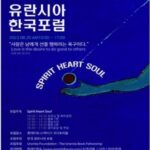 There is a substantial number of Urantia Book readers in Korea who have been studying the Korean translation for many years. As they are our closest neighbour of readers in the Asia region, we wanted to share with you their latest news about an upcoming conference. This is the second conference held by Korea Urantia Forum (UKF) and will be held 20 August 2023 at the Lotte Tower Sky 31 Auditorium Forum (the tallest building in Seoul Korea) It overlooks the panorama of Seoul and the Han River.
There is a substantial number of Urantia Book readers in Korea who have been studying the Korean translation for many years. As they are our closest neighbour of readers in the Asia region, we wanted to share with you their latest news about an upcoming conference. This is the second conference held by Korea Urantia Forum (UKF) and will be held 20 August 2023 at the Lotte Tower Sky 31 Auditorium Forum (the tallest building in Seoul Korea) It overlooks the panorama of Seoul and the Han River.
We wish them a very successful conference and pray it will help students deepen their an understanding of Urantia Book’s principles and values in the hope of spreading the revelation in their country.
Here is what is planned:
- Opening Ceremony, including a video welcome by Pato Banton
- Spirit, Heart and Soul (Conference Theme), presented by Vella Aram Lee
- Spiritual Search, Pursuit and its Experience and Contemplation, by Asha Jung Hee Lee
- Jesus’ life after his resurrection and comparison to his childhood experience, by Mahan
- Origins of Personality and Love, by Uro
- Human Knowledge and Evolution
- Progression of Human Knowledge and Evolution towards Spiritualization attainment, by Yupa Si Hyun
- Man and Woman, how they meet, focusing on marriage and family, by Mullya
- The last segment will be a presentation and feedback/discussion session with the presenters and attendees. This is a new concept for their Korean culture and the goal is to advance group wisdom via participation. The vision is to establish The Urantia Book in Korean culture of over 5000 years; with a population of 50 million who underwent numerous strife and wars and has the largest population of Catholics and Christians in Northeastern Asia.
Conference website: https://urantiaforum.modoo.at/ (the site can be translated into English)

|
|
Anzura Admin 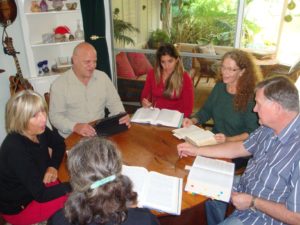 ANZURA maintains a contact list for study group hosts. ANZURA maintains a contact list for study group hosts.
Not all of these hosts actually run a regular study group but all of them are willing to host one for anyone who would like to meet.
Some study groups include virtual participation via Zoom if you cannot meet face-to-face.
Click here to view the list of contacts on the website.
|
|
ANZURA Admin 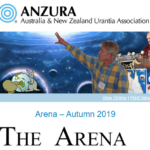 The Arena newsletter keeps students of The Urantia Book throughout Australia, New Zealand and the South Pacific in touch with Urantia related news, activities and events from our local region as well as from the global Urantia Book reader community. It also provides interesting articles written by readers on a wide range of subjects from the book which we hope may be helpful in assisting with your studies.
The Arena newsletter keeps students of The Urantia Book throughout Australia, New Zealand and the South Pacific in touch with Urantia related news, activities and events from our local region as well as from the global Urantia Book reader community. It also provides interesting articles written by readers on a wide range of subjects from the book which we hope may be helpful in assisting with your studies.
The Arena is published by ANZURA two to three times a year and is dedicated to the promotion of goodwill and understanding among readers of The Urantia Book. Articles and editorial contributions that relate to The Urantia Book and its teachings are welcome from readers all over the world.
If you would like to receive the Arena or submit an article, please send us an email at anzura.urantia @ gmail.com
To view current and past issues of the Arena click here.
ANZURA's Contact Details
ANZURA
P.O. Box 1581
Warriewood, NSW 2102
Australia
Phone: 0431 285 943 (from Australia) or +61 431 285 943 (international)
Email: anzura.urantia@gmail.com
Website: https://anzura.urantia-association.org
Please note: Any interpretations, opinions, conclusions, or artistic representations, whether stated or implied, are those of the authors and do not necessarily represent the views and opinions of ANZURA or the editorial team of the Arena.
|
|

